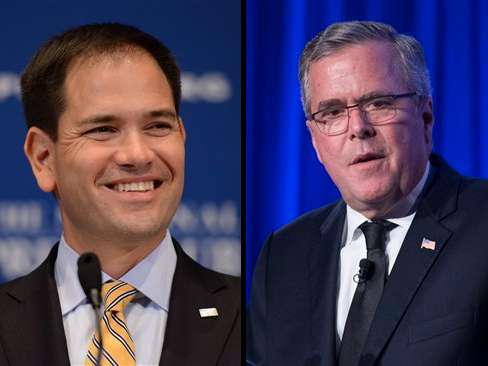A new Florida poll shows that Sen. Marco Rubio (R-FL) is gaining on former Gov. Jeb Bush, and the state is still very much looking like a battle between the two, with no other Republican candidate even close to competitive at this point.
The poll, available online, was conducted May 25-31, 2015 by Saint Leo University Polling Institute of 535 Florida adults. The margin of error is +/- 4.5 percent with a 95 percent level of confidence.
Rubio has noticeably higher favorability ratings than Bush among both the likely Republican voters and likely Independent voters who answered the poll. In Florida, only registered Republicans can vote in the Republican primary elections, and only Democrats can vote in the Democratic primaries, so many self-identified Independents will chose to register with a party simply so they can participate.
Among them, 30 percent preferred Bush, 24 percent Rubio, then a sharp drop off to a list of candidates in the single digits. Gov. Scott Walker (R-WI), retired neurosurgeon Ben Carson, and Sen. Rand Paul (R-KY) all received 7 percent. Former Gov. Mike Huckabee (R-AR) received 6 percent, Gov. Chris Christie (R-NJ) and Ted Cruz (R-TX) 3 percent, Gov. Bobby Jindal (R-LA) and former Sen. Rick Santorum (R-PA) 2 percent, and the remaining candidates 1 percent or less. Huckabee and Carson are now Florida residents, but so far that does not seem to have given them much of an advantage as compared to Bush and Rubio, who have appeared on Florida ballots before.
These results reflect a one point drop for Bush since a previous Saint Leo poll conducted in March, and an eight point gain for Rubio. Rubio was also heavily favored when poll respondents were asked for their second choice, with 29 percent picking Rubio, 12 percent Bush, and again the remainder of the candidates receiving single digit results.
In a head-to-head matchup between Rubio and Bush, Rubio won 48 percent to 40 percent among Republicans.
The poll also asked which candidate respondents thought was most likely to win the Republican nomination, regardless of who they personally supported. Thirty-four percent answered Bush, down from 38 percent in March, and 27 percent answered Rubio, up significantly from 9 percent in March.
Rubio has noticeably higher favorability ratings than Bush among both the likely Republican voters and likely Independent voters who answered the poll.
Among the 146 Republicans who responded, for Rubio, 43 percent had a strongly favorable opinion, 38 percent had a somewhat favorable opinion, 8 percent somewhat unfavorable, 4 percent not at all favorable, 3 percent haven’t heard of him, and 4 percent don’t know/not sure. For Bush, 36 percent of the Republicans had a strongly favorable opinion, 43 percent had a somewhat favorable opinion, 9 percent somewhat unfavorable, 10 percent not at all favorable, 2 percent haven’t heard of him, and less than one percent don’t know/not sure.
Among 80 Independent respondents, 14 percent had a strongly favorable opinion of Rubio, 39 percent had a somewhat favorable opinion, 19 percent somewhat unfavorable, 23 percent not at all favorable, 3 percent haven’t heard of him, and 4 percent don’t know/not sure. For Bush, 16 percent of the Independents had a strongly favorable opinion, 23 percent had a somewhat favorable opinion, 28 percent somewhat unfavorable, 29 percent not at all favorable, 3 percent haven’t heard of him, and 3 percent don’t know/not sure.
Of course, it is still very early in the race. Bush will not even officially be a candidate until Monday. However, this poll does illustrate a trend that seems to be favoring Rubio. As Politico’s Florida reporter Marc Caputo noted, “a general rule of thumb about comparing the same pollster’s surveys over time is that the trend can speak louder than the specific topline numbers. And the trend looks (and feels) to be with Rubio over Jeb in Florida (and maybe even nationwide). If Rubio bests Jeb here March 15, the blow to the former governor will be hard to understate.”
The poll also showed that former Secretary of State Hillary Clinton remains a strong frontrunner among likely Florida Democrat voters, winning 60 percent of the vote. The next closest was 11 percent for Vice President Joe Biden, followed by 5 percent for Sen. Bernie Sanders.
Follow Sarah Rumpf on Twitter @rumpfshaker.

COMMENTS
Please let us know if you're having issues with commenting.